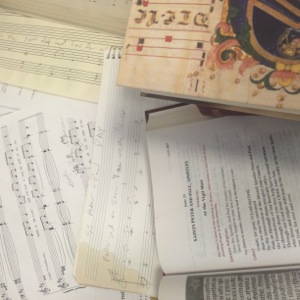 Y DESK IS A mess—a veritable disaster. Once every few months, whether it needs it or not, I clear off and reorganize my desk. I can then remember what color it is. I usually find a few old drafts of compositions. However, my filing system is highly efficient. Everything’s out.
Y DESK IS A mess—a veritable disaster. Once every few months, whether it needs it or not, I clear off and reorganize my desk. I can then remember what color it is. I usually find a few old drafts of compositions. However, my filing system is highly efficient. Everything’s out.
Germane to the discussion of my working environment: Last week, Veronica Brandt wrote a brilliant article: It’s not about talent. She hits home her point here: “In short, talent just doesn’t come into it. The thing that makes music happen is lots and lots of work.” Very few see the work behind the final product. Some make it look easy, but it never is. The work is a form of service. Talent without work leads to artistic and personal atrophy. One may never blossom into the mature artist on talent alone. Hard work sometimes over the course of decade, is the only way to make a small difference in the world.
Understanding that our work is service to God, the liturgy, and to humanity, composition is a form of service, especially if approached in a certain way. While it is important to develop one’s own voice, the function of a work is primary. Self-glorification cancels out a true sense of purpose. Today, this true purpose is to help the faithful pray the words of the Mass, and not to be a form of personal self-expression. This may be a dangerous frontier, to be certain. But in the end, we will find God at our center.
 ORE THAN FIFTY YEARS after the Second Vatican Council, the frontier of composition is clearly producing new settings of the propers in the vernacular, useful for a typical parish. This is not unlike the time immediately after the Second Vatican Council. The frontier of liturgical composition then was the need for settings in the vernacular to be sung by a congregation. In the United States, this elicited results in the 1970s ranging from the St. Louis Jesuits to Theodore Marier. Then what was the frontier became the norm.
ORE THAN FIFTY YEARS after the Second Vatican Council, the frontier of composition is clearly producing new settings of the propers in the vernacular, useful for a typical parish. This is not unlike the time immediately after the Second Vatican Council. The frontier of liturgical composition then was the need for settings in the vernacular to be sung by a congregation. In the United States, this elicited results in the 1970s ranging from the St. Louis Jesuits to Theodore Marier. Then what was the frontier became the norm.
But now, many of us are aware of the awakening of “singing the Mass” rather than “singing at Mass.” Many, many composers have tackled the propers. As such, singing the propers—an integral part of singing the Mass—is slowly making its way into the mainstream.
Dr. Jerry Galipeau, Vice President and Chief Publishing Officer at J. S. Paluch Company and World Library Publications, recently wrote in his blog Gotta Sing Gotta Pray:
”…the introduction of the proper communion antiphons is still a work in progress. I believe it takes years for this practice to really become a part of the music at Mass. This was a great example of “singing the Mass,” rather than “singing at Mass.”
While I have been working on Communion propers for the entire year (more to come out soon with WLP) my desk is a colossal mess because of all my reference books to do this work. Others did the work before me: recent publications from Adam Bartlett, Richard Rice especially are constant reference materials. The publications from Solesmes have been a constant companion.
The work is also a form of prayer. Meditate on the Antiphons and type in every work of the psalm verses and you cannot help but be transformed. Obsess and constantly revise harmonizations and stay awake longer at night to make a tiny contribution that might be useful to some modest parish somewhere? I hope it is prayer. I hope it is of service to some. But service is what God asks of us every single day of our lives.
Soli Deo gloria


